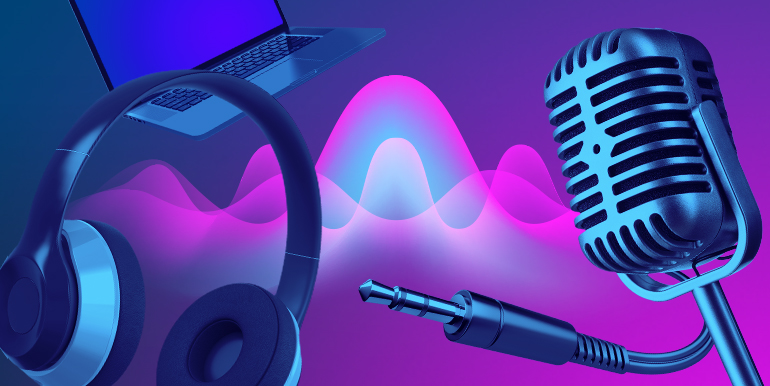
True confession: I’ve worked in broadcasting and media production in some form since before I was in high school. My first love was radio. My brother and I would write plays, stories, and news—then record and play them back on my dad’s SONY tape recorder. Had the Internet been around, we could have published those recordings as podcasts.
The world’s first podcast (by that name) was created in 2004. Today there are just over 700,000 podcasts on various channels and networks, in every conceivable language.
You’d think with all that choice it would be hard to attract an audience. That’s simultaneously true and false, but mostly false for a couple of reasons.
First, podcasting is not like terrestrial radio you’d listen to in the car. While that seems obvious, what we’re really talking about is distribution. In basic terms, radio is audio content distributed live via radio waves. Podcasting is exactly the same kind of content, usually pre-recorded, and distributed via the Internet. You can listen to both at home, or while mobile.
Second, content on traditional radio is usually very general; it’s meant to appeal to a wide and varied audience. Podcasts are the opposite. Podcasts are all about finding your niche. The more focused your podcast, the more likely you are to attract the exact audience you want.
Now to the audience question: If a traditional radio station has 10,000 listeners during a block of time, that’s a much bigger audience than a podcast with 50 listeners, right?
Wrong. Podcast listeners, especially subscribers, are qualified listeners. They’re invested in your podcast. When someone subscribes to a podcast, it’s a signal the listener wants to receive your content the moment it’s available. When someone downloads a podcast about debt collection, you can bet it’s a small to medium business looking for answers to debt problems.
Podcasting is growing. According to a survey by Edison Research and Triton Digital, half of Canadians have listened to a podcast in the last year, a third are regular podcast listeners. Of those regular podcast listeners, most listen to between five and seven podcasts regularly. Canadian listeners are also split equally by gender, income, and age.
Businesses should love podcasts too. To be effective at what it does, every business has experts with a message. The message can be that your product is unique, or simply priced better than the competition. Your business can curate and control its message on its own show.
Like most things, podcasting is easy. Good podcasting isn’t. By nature, businesses tend to focus on what they do to earn money and ignore everything else. Focus is exactly what you need to have a successful podcast. To put it another way: you’re already an expert on your business, so why not have an ongoing conversation with your customers? Rather than just talking when customers come in, a podcast affords the opportunity for a business to talk about products, services, challenges, and sometimes, just float ideas in their particular business. In addition to helping your existing clientele, it’s a way to build authority with an entirely new audience of prospective customers.
I’m going to put the production and technical side of podcasting aside. You have subject matter expertise in the realm of your business offering. At Graphos we have our marketing expertise, including deep knowledge about audio production and distribution.
Instead of try to teach you the complicated parts you don’t need to know, I want to dispel four myths about podcasting.
1. Podcasts are a fad.

I’m not writing a blog post on podcasting because it’s not a thing. I produced my first podcast in 2006. It was called “Oilers Live,”— a live-streamed “email in” show where I would take questions online, and pose questions to the Edmonton Oilers players. They still do that. It’s not a fad, it’s just different distribution. The podcast growth curve is turning into a spike: it’s getting steeper in both number of podcasts and total number of podcast listeners. That growth continues to accelerate. It’s more likely a cultural phenomenon than a fad.
2. Podcasting lacks a proven financial model.
 While this is partly true, a revenue model is only relevant if making revenue is the principal goal of the podcast. 700,000 podcasts suggests it’s not all about money. For businesses, you’re creating a media channel to get your message out, your way. How much would you expect to pay for a globally accessible radio program? Exactly. The cost of podcasting is incidental to its reach. (And incidentally, there are numerous ways to monetize a podcast, via advertising and other means. Building audience generally comes first, and that only happens through good targeting and quality content.)
While this is partly true, a revenue model is only relevant if making revenue is the principal goal of the podcast. 700,000 podcasts suggests it’s not all about money. For businesses, you’re creating a media channel to get your message out, your way. How much would you expect to pay for a globally accessible radio program? Exactly. The cost of podcasting is incidental to its reach. (And incidentally, there are numerous ways to monetize a podcast, via advertising and other means. Building audience generally comes first, and that only happens through good targeting and quality content.)
3. Good podcasts just happen.
 Good podcasts can sound like chaotic free-wheeling topical conversations, but they’re actually carefully scripted, and planned. If you have an experienced broadcaster handy, you can skip a bit of the planning. But really, you want to have a clear central message for each episode. And if you really plan ahead, you’ll map out a season of podcasts so that each episode is part of a larger information or narrative arc—just like any series on TV or radio.
Good podcasts can sound like chaotic free-wheeling topical conversations, but they’re actually carefully scripted, and planned. If you have an experienced broadcaster handy, you can skip a bit of the planning. But really, you want to have a clear central message for each episode. And if you really plan ahead, you’ll map out a season of podcasts so that each episode is part of a larger information or narrative arc—just like any series on TV or radio.
4. A podcast is an audio version of me.
 This isn’t entirely a myth because your podcast is definitely a reflection of you. But you really want it to be the best version of you. The active, energetic, engaged version. Your secret weapon to achieve that: your voice. The best podcasts are entertaining because the content is engaging, and the speakers are interesting to hear. The announcers don’t merely say interesting things, but they say them in an interesting way. Inflection, intensity, pitch, and silence are all brushes to use on the sonic canvas.
This isn’t entirely a myth because your podcast is definitely a reflection of you. But you really want it to be the best version of you. The active, energetic, engaged version. Your secret weapon to achieve that: your voice. The best podcasts are entertaining because the content is engaging, and the speakers are interesting to hear. The announcers don’t merely say interesting things, but they say them in an interesting way. Inflection, intensity, pitch, and silence are all brushes to use on the sonic canvas.
I could write thousands of words on each of those points. In fact, I did when I taught broadcasting at the Northern Alberta Institute of Technology (Nait). Instead I want to offer you an amazing shortcut to learn about podcasting.
Graphos is presenting PodSummit III in Calgary on June 22. It’s a full day of lectures, seminars, and activities. There will be sessions on how to start a podcast, promote it, and stand out from the crowd as well as continuous improvement strategies. I’m leading a session on the art of the podcast. My own focus will be on show planning and performance.
Podcasting is part of our culture. You can insert your business into the culture, and provide valuable service to your customers, with strengthening your connection with them. If you’re just curious, or if you’re a podcaster who wants to improve, PodSummit III is an opportunity to rub shoulders with experienced producers and experts in the field and learn in a day as packed with fun as it is with
information (charge your phone—you’ll be taking a LOT of pictures of presentation slides).
Hope to see you there, and to become one of your new podcast’s loyal subscribers!

